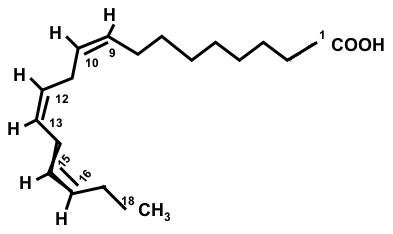 Chemically speaking, this FATTY ACID has 18 carbons and a pair of double bonds. It cannot be synthesized by the body and must be obtained from the diet. A POLYUNSATURATED FATTY ACID, it is classified as an essential dietary nutrient. Alpha linolenic acid is the smallest of the omega-3 family of polyunsaturated fatty acids, distinguished by subtle structural differences in which the double bonds begin at the third carbon from the end. It is the building block of larger omega-3 acids, including EICOSOPENTAENOIC ACID and DOCOSOHEXAENOIC ACID (DHA), which in turn form the PG3 class of PROSTAGLANDINS, hormone-like substances that decrease inflammation, decrease blood clotting and lower blood CHOLESTEROL. PG3 prostaglandins help return the body to equilibrium after physical stress or injury.
Chemically speaking, this FATTY ACID has 18 carbons and a pair of double bonds. It cannot be synthesized by the body and must be obtained from the diet. A POLYUNSATURATED FATTY ACID, it is classified as an essential dietary nutrient. Alpha linolenic acid is the smallest of the omega-3 family of polyunsaturated fatty acids, distinguished by subtle structural differences in which the double bonds begin at the third carbon from the end. It is the building block of larger omega-3 acids, including EICOSOPENTAENOIC ACID and DOCOSOHEXAENOIC ACID (DHA), which in turn form the PG3 class of PROSTAGLANDINS, hormone-like substances that decrease inflammation, decrease blood clotting and lower blood CHOLESTEROL. PG3 prostaglandins help return the body to equilibrium after physical stress or injury.Omega-3 fatty acids are deficient in the standard American diet, and this deficiency may be linked to an increased risk of heart attacks and inflammation associated with degenerative disease. Chronic, severe deficiencies impair vision, increase inflammation, and diminish learning curves in experimental animals. The utilization of alpha linolenic acid may be limited in some disease states. The nervous system and brain contain high levels of the omega-3 fatty acids, and there is a positive relationship between the content of these fatty acids in the diet and vision and brain function. Pre-term babies need DHA because their livers are not mature enough to synthesize it from alpha linolenic acid.
Good dietary sources of the omega-3 fatty acids are limited. Breast milk contains omega-3 fatty acids, suggesting their importance in an infant’s growth and development. Food processing destroys or removes the omega-3s, and there are none in FAST FOODS such as PIZZA, fried FISH sandwiches, fried chicken, or HAMBURGERS. The most common sources are fish and FISH OILS, FLAXSEED OIL, and pumpkin seeds; fish oil and flaxseed oil are sold as supplements. Because oils containing essential fatty acids readily oxidize and become rancid they need to be protected from oxygen and heat. They are usually packaged with ANTIOXIDANTS, such as VITAMIN E. Buying small quantities of these oils and refrigerating them in sealed containers after opening reduces the risk of rancidity. These oils should not be used for cooking.


 A cultivated, elongated nut with white meat and a brown skin. The almond tree resembles the PEACH, to which it is related. The almond originated in Asia and was known to the Romans as the “Greek nut.” There are two varieties: the sweet almond and the bitter almond, which has a stronger flavor. Almond extracts are used to flavor cakes and pastries, and slivered or flaked sweet almonds are used in cakes, cookies, and pastry. Dried almonds are served raw or roasted and salted. Nuts roasted with coconut or palm oil dramatically increase their caloric content and increase their SATURATED FAT content. Almonds are also used as ingredients of stuffings and couscous, and they can accompany FISH or POULTRY dishes (the garnish is known as amandine). Almonds are a good source of CALCIUM and they are also rich in oil. Most of the oil is monounsaturated and more closely resembles OLIVE OIL than typical vegetable oils like SAFFLOWER oil, which are high in polyunsaturates. One ounce (28 g) of raw, sweet almonds provides 167 calories; carbohydrate, 5.7 g; fiber, 3 g; fat, 14.8 g; protein, 5.9 g; calcium, 75 mg; iron, 1.0 mg; niacin, 0.95 mg; thiamin, 0.06 mg; riboflavin, 0.22 mg.
A cultivated, elongated nut with white meat and a brown skin. The almond tree resembles the PEACH, to which it is related. The almond originated in Asia and was known to the Romans as the “Greek nut.” There are two varieties: the sweet almond and the bitter almond, which has a stronger flavor. Almond extracts are used to flavor cakes and pastries, and slivered or flaked sweet almonds are used in cakes, cookies, and pastry. Dried almonds are served raw or roasted and salted. Nuts roasted with coconut or palm oil dramatically increase their caloric content and increase their SATURATED FAT content. Almonds are also used as ingredients of stuffings and couscous, and they can accompany FISH or POULTRY dishes (the garnish is known as amandine). Almonds are a good source of CALCIUM and they are also rich in oil. Most of the oil is monounsaturated and more closely resembles OLIVE OIL than typical vegetable oils like SAFFLOWER oil, which are high in polyunsaturates. One ounce (28 g) of raw, sweet almonds provides 167 calories; carbohydrate, 5.7 g; fiber, 3 g; fat, 14.8 g; protein, 5.9 g; calcium, 75 mg; iron, 1.0 mg; niacin, 0.95 mg; thiamin, 0.06 mg; riboflavin, 0.22 mg.